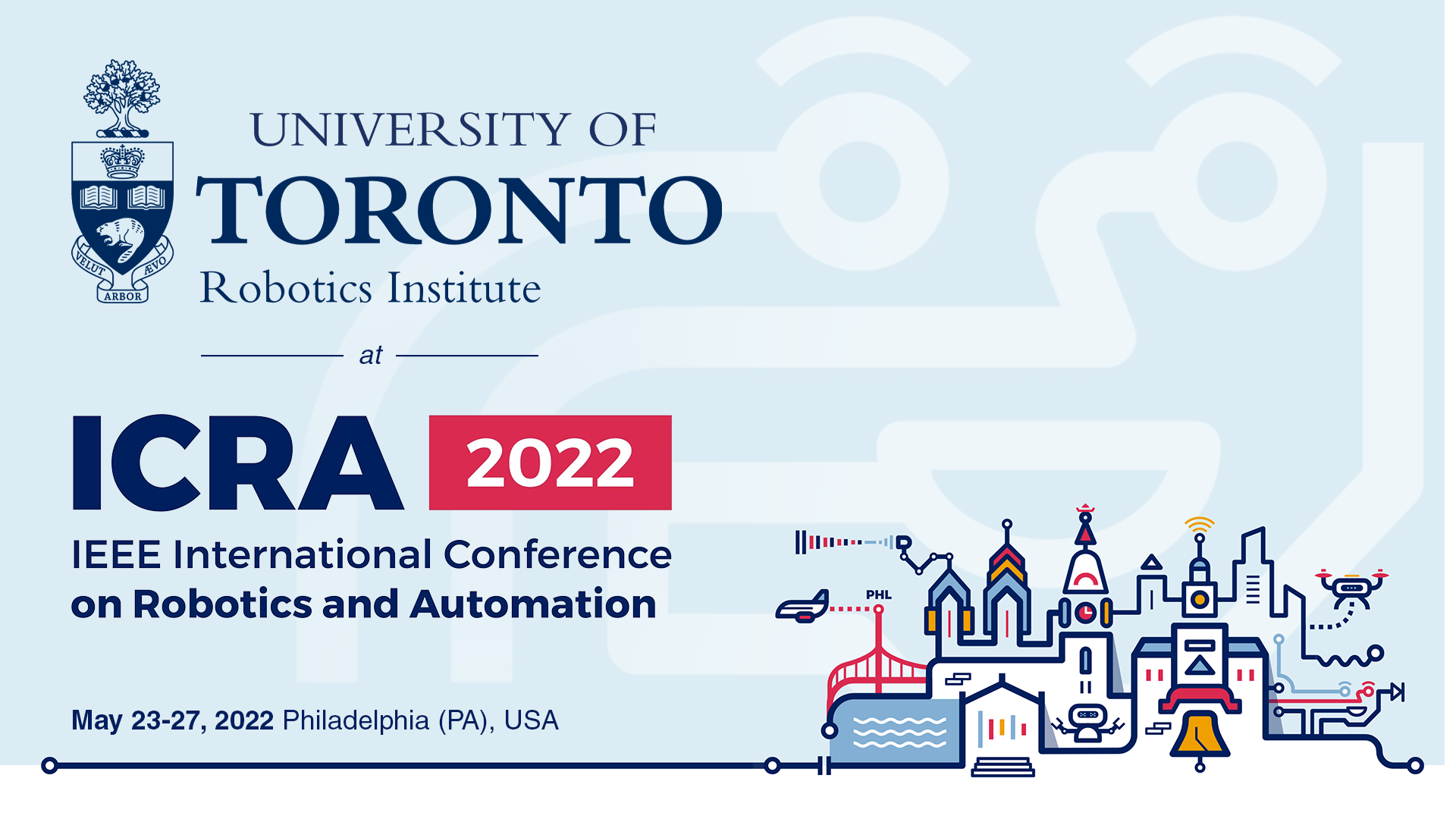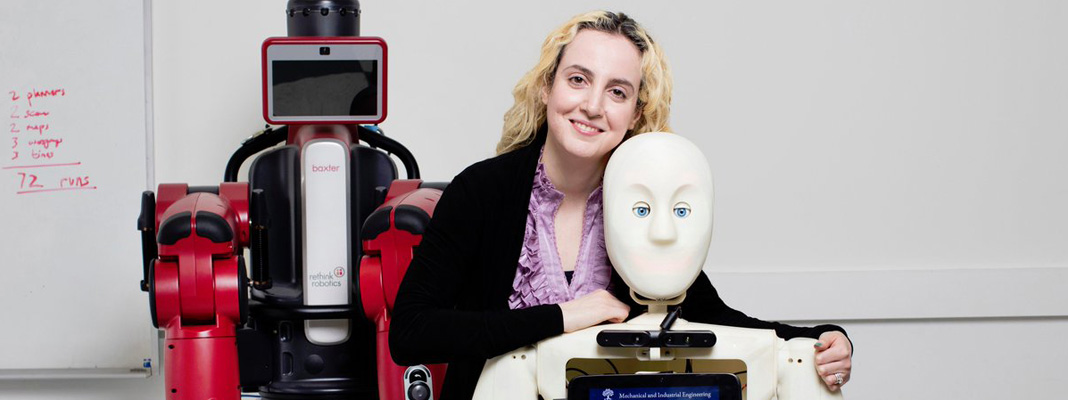
Once again, the University of Toronto Robotics Institute will have a strong presence at the 2022 International Conference of Robotics and Automation:
- Jessica Burgner-Kahrs, Robotics Institute Associate Director, will present at two workshops – Frontiers of Endoluminal Intervention: Clinical opportunities and technical challenges, and New frontiers of parallel robotics (second edition)
- Mishu Duduta, one of our newest Robotics Institute members, will lead the Energy Storage and Delivery in Robotics Systems workshop
- Angela Schoellig will host Releasing Robots into the Wild: Simulations, Benchmarks, and Deployment
- Goldie Nejat will present at the workshop Intelligent Control Methods and Machine Learning Algorithms for Human-Robot Interaction and Assistive Robotics.
- Animesh Garg will be part of Behaviour Priors in Reinforcement Learning for Robotics Workshop
Scroll down to read about each workshop, or register now.
Frontiers of Endoluminal Intervention: Clinical opportunities and technical challenges
Presenters include: Giulio Dagnino, Jessica Burgner-Kahrs, Arianna Menciassi, and Helge Arne Wurdemann.
There is an increasing convergence of endoluminal and endoscopic therapies for different surgical specialties. For minimally invasive cardiovascular intervention, endovascular approaches have been extended beyond cardiac ablation, angioplasty and stenting to complex aneurysm repair and valve replacement. For the gastrointestinal tract, there is an increasing need to deploy surgical instruments and deliver therapeutic agents to small ductal systems for diagnosing and treating diseases. For the respiratory system, endobronchial procedures are increasingly used for interventions such as valve placement for lung volume reduction, and locating peripheral nodules for cancer biopsy.
Technically, different solutions have been proposed for endoluminal intervention. Continuum robotics such as concentric tubes, multi-backbone and soft structures, has evolved and generated interest among clinicians in potential medical applications.
This workshop aims to address clinical opportunities, technical requirements and regulatory challenges for translating continuum robotics to practical clinical use. It is designed as an interactive workshop between researchers, engineers and clinicians to brainstorm about the different areas and identify barriers to using continuum robots in a clinical setting. The result of the workshop will be to create a list of technical and clinical challenges that need to be resolved while also serving to build bridges between the clinical, engineering and regulatory communities.

New frontiers of parallel robotics (second edition)
Presenters include Briot, Sébastien Briot, Jessica Burgner-Kahrs, Marco Carricato, and Giuseppe Loianno.
Rigid-link fixed-base parallel robotics is a mature research area and an enabler for the development of a diverse range of industrial applications (e.g. pick-and-place manipulation, machine-tools, simulators, etc). Fundamental scientific questions for these robots are now solved, which lead to a decrease in their scientific interest.
Over the past decade, innovation resulted in new types of parallel robotic devices such as soft/continuum robots, flying robots, cable-driven robots, underactuated robots, multi-finger hands, etc. These novel closed-chain mechanisms, with no rigid links or no fixed base or no traditional end-effector, are associated with new scientific challenges in terms of design, modelling, and control. While those scientific questions are exciting they remain largely unsolved, and prevent new parallel robots from passing academia to industry or society.
This workshop aims at:
- Bringing together researchers from distinct communities (e.g. soft/continuum robotics, compliant mechanisms, aerial robotics, cable-driven robotics, tensegrity structures, dexterous manipulation and physical interactions) with common interest in parallel robotics to share their experiences, methods, challenges, and issues;
- Fostering interest and collaboration of researchers to investigate the exciting research challenges arising from the new frontiers in parallel robotics.

Energy Storage and Delivery in Robotics Systems
Presenters include Mishu Duduta, Zeynep Temel, James Pikul.
Power is a persistent challenge in autonomous robots across multiple functions and sizes. Energy storage is often the limiting factor in a system’s weight and operating time. High-power maneuvers such as jumping and flying increase maneuverability but demand novel transmissions. This workshop will bring together diverse fields to discuss this common limitation. Topics will range from micro-robotics, soft robotics, impulsive systems, medical devices, and beyond. The workshop will include presentations and demonstrations of cutting-edge approaches, as well as discussions to develop a unified framework.
Releasing Robots into the Wild: Simulations, Benchmarks, and Deployment

Presenters include Angela Schoellig, Davide Scaramuzza, Adam Hall, Zhaocong Yuan, Jacopo Panerati, Siqi Zhou, Lukas Brunke, and Melissa Greeff
Machine learning and learning-based control promise to lead robot capabilities and performance beyond what human designs can attain. However, the results from recent years of fast-paced progress in reinforcement learning and learning-based control have proven challenging to compare. While acknowledging that learning robots carry a plethora of fascinating open research questions, in this workshop, we specifically eye physics-based simulations and learning for decision making. We argue that two important roadblocks hamper the transfer of robot learning research into real-world applications: (i) the scarcity of sufficiently realistic simulation tools, tasks, and datasets to reliably compare algorithmic progress; and (ii) the lack of reliable and repeatable processes to transfer those simulation results to the real-world.
Mojtaba Sharifi, Mahdi Tavakoli, Vivian Mushahwar, Hermano Krebs, Goldie Nejat, Thrishantha Nanayakkara, and David Abbink.

Human-robot interaction (HRI), collaborative robotics (CR), and assistive robotics (AR) are promising research areas to improve the quality of human life by helping individuals in occupational tasks, routine activities, and therapy programs. At the same time, robotic systems have benefited from the advancement of Artificial Intelligence (AI) to perceive their environment and achieve their goals autonomously. However, the safety of human operators/users is still a concern while increasing the autonomy of robotic systems in HRI applications, which necessitates conservative stability considerations and boundedness of the robot response. In this workshop, innovative ideas from the experts and outstanding researchers actively contributed to the field of HRI, CR, and AR will be introduced to broaden the vision on the development of AI-based techniques, Machine Learning (ML) algorithms, and intelligent control schemes that can facilitate a balance between robot autonomy and human safety in various applications. The workshop is organized to include interactive keynote talks as well as round-table discussions and poster presentations. This workshop will provide an excellent venue for researchers from academia and industrial sectors to engage in discussions of future innovations for autonomous HRI, and intelligent CR and AR.
Behaviour Priors in Reinforcement Learning for Robotics Workshop
Pieter Abbeel, Doina Precup, Davide Scaramuzza, Nicolas Heess, Animesh Garg, Kelsey Allen with moderator Markus Wulfmeier
Topics may include:
-
Skills learning of behaviour priors
-
Behaviour priors in hierarchical RL
-
Meta-learning behaviour priors
-
Behaviour priors for planning
-
Modularity and compositionally of behaviour priors
-
Residual RL
-
Continual/transfer learning in RL
-
Exploration bias using behaviour priors
-
Implications of information asymmetry
-
Dynamic Movement Primitives as behaviour priors
Register for ICRA 2022 workshops at: https://www.icra2022.org/program/workshops-and-tutorials
